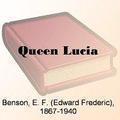CHAPTER 13, part 5
It was after the first seance that the frenzy for spiritualism seized Riseholme. The Princess with great good-nature, gave some further exhibitions of her psychical power in addition to the seances, and even as Georgie the next afternoon was receiving Lucia's cruel verdict about Debussy, the Sybil was looking at the hands of Colonel Boucher and Mrs Weston, and unerringly probing into their past, and lifting the corner of the veil, giving them both glimpses into the future. She knew that the two were engaged for that she had learned from Mrs Quantock in her morning's drive, and did not attempt to conceal the fact, but how could it be accounted for that looking impressively from the one to the other, she said that a woman no longer young but tall, and with fair hair had crossed their lives and had been connected with one, of them for years past? It was impossible to describe Elizabeth more accurately than that, and Mrs Weston in high excitement confessed that her maid who had been with her for fifteen years entirely corresponded with what the Princess had seen in her hand. After that it took only a moment's further scrutiny for the Princess to discover that Elizabeth was going to be happy too. Then she found that there was a man connected with Elizabeth, and Colonel Boucher's hand, to which she transferred her gaze, trembled with delightful anticipation. She seemed to see a man there; she was not quite sure, but was there a man who perhaps had been known to him for a long time? There was. And then by degrees the affairs of Elizabeth and Atkinson were unerringly unravelled. It was little wonder that the Colonel pushed Mrs Weston's bath-chair with record speed to "Ye signe of ye daffodil," and by the greatest good luck obtained a copy of the "Palmist's Manual." At another of these informal seances attended by Goosie and Mrs Antrobus, even stranger things had happened, for the Princess's hands, as they held a little preliminary conversation, began to tremble and twitch even more strongly than Colonel Boucher's, and Mrs Quantock hastily supplied her with a pencil and a quantity of sheets of foolscap paper, for this trembling and twitching implied that Reschia, an ancient Egyptian priestess, was longing to use the Princess's hand for automatic writing. After a few wild scrawls and plunges with the pencil, the Princess, though she still continued to talk to them, covered sheet after sheet in large flowing handwriting. This, when it was finished and the Princess sunk back in her chair, proved to be the most wonderful spiritual discourse, describing the happiness and harmony which pervaded the whole universe, and was only temporarily obscured by the mists of materiality. These mists were wholly withdrawn from the vision of those who had passed over. They lived in the midst of song and flowers and light and love.... Towards the end there was a less intelligible passage about fire from the clouds. It was rendered completely intelligible the very next day when there was a thunderstorm, surely an unusual occurrence in November. If that had not happened Mrs Quantock's interpretation of it, as referring to Zeppelins, would have been found equally satisfactory.

